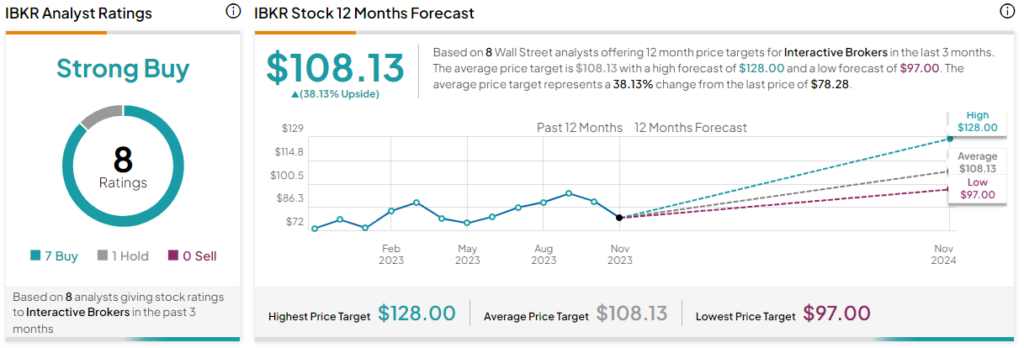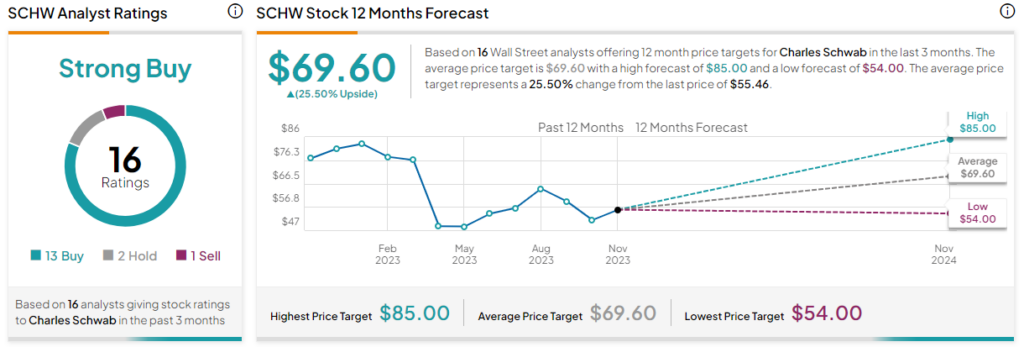In this piece, I evaluated two online brokerage stocks, Interactive Brokers (NASDAQ:IBKR) and Charles Schwab (NYSE:SCHW), using TipRanks’ comparison tool to determine which is better. A deeper analysis suggests Interactive Brokers may be too cheap to ignore — while Charles Schwab just has too many problems.
Meet Your ETF AI Analyst
- Discover how TipRanks' ETF AI Analyst can help you make smarter investment decisions
- Explore ETFs TipRanks' users love and see what insights the ETF AI Analyst reveals about the ones you follow.

Interactive Brokers is a brokerage firm that operates the largest electronic trading platform in the U.S. by number of daily revenue trades. Charles Schwab is a financial services company that offers banking, commercial banking, investing, and wealth management services.
Interactive Brokers shares are still up 13% year-to-date after plunging 11% over the last three months, although the stock is up only 7% over the last 12 months. Meanwhile, Charles Schwab stock has plummeted 32% year-to-date, including an 8% decline over the last three months. Schwab shares are off 28% over the last 12 months.
The root cause of this massive divergence in stock price performance was the regional banking crisis earlier this year, which sent Schwab shares plunging from about $75 on March 6 to $52 on March 12. The stock has bounced along since then but never recovered to those heights.
A closer look is now in order to determine whether that sell-off has made Schwab undervalued and where Interactive Brokers stands in comparison to Schwab and the overall industry. For comparison, the diversified financials industry is trading at a P/E of 19.4 versus its three-year average of 29.5.
Interactive Brokers (NASDAQ:IBKR)
At a P/E of 14.4, Interactive Brokers is trading at a steep discount to its industry and to Charles Schwab, especially considering its mean P/E of 22.5 since February 2019. Unfortunately, the company’s stock has been marching steadily lower since September 7, when it hit record highs of nearly $96. Still, Interactive Brokers’ recent pullback and long-term stock price gains suggest a bullish view might be appropriate.
Whenever a stock reaches a new record high, it’s not uncommon for insiders to start taking profits, and that does appear to be happening in Interactive Brokers. In fact, insiders appear responsible for a significant portion of the recent selling pressure, given that they’ve unloaded $43.1 million worth of their shares in Informative Sell transactions in the last three months.
However, a closer look at the company doesn’t reveal any serious problems or news that could be weighing heavily on its shares. In fact, Interactive Brokers shares are up 46% over the last three years and 55% over the last five years.
Meanwhile, the company continues to chug along with growing net income margins, which rose from 9% in 2020 to 11% in 2021, 12% in 2022, and 13.6% in the last 12 months. Additionally, the company continues to grow its revenue at a steady clip, recording total revenues of $2.2 billion in 2020, $2.75 billion in 2021, and $3.2 billion in 2022.
Over the last 12 months, Interactive Brokers has raked in $4.2 billion in total revenues, confirming that this company remains quite solid despite the recent sell-off in its shares. More recently, the firm reported Q3 2023 net revenues of $1.1 billion compared to $790 million a year ago. Thus, this may be a good time to pick up some shares of the stock to hold for the long term.
What is the Price Target for IBKR Stock?
Interactive Brokers has a Strong Buy consensus rating based on seven Buys, one Hold, and zero Sell ratings assigned over the last three months. At $108.13, the average Interactive Brokers stock price target implies upside potential of 38.1%.

Charles Schwab (NYSE:SCHW)
At a P/E of 18.5, Charles Schwab is trading just under the valuation of its industry, which is surprising considering the year-to-date sell-off in the shares. However, the firm’s wrong-way bet on interest rates last year has caused massive unrealized losses that continue to rise and could take some time to work through. Thus, a neutral view seems appropriate, at least for now.
In 2022, Charles Schwab had expected the Federal Reserve to raise interest rates by only 75 basis points, but the Fed went on to raise rates by 425 basis points. This year, rates have increased even further, bringing the federal funds rate to a range of 5.25% to 5.5%.
Meanwhile, the firm’s unrealized bond losses have widened to $19.4 billion. In connection with those paper losses, Charles Schwab went from having negative net debt of -$42.2 billion in 2022 to $17.3 billion in net debt over the last 12 months.
Additionally, the firm’s third-quarter net revenues fell from $5.5 billion in 2022 to $4.6 billion in Q3 of 2023, and its net income plunged from $2 billion in Q3 2022 to $1.1 billion in the most recent quarter. In fact, the firm’s struggles this year have even caused it to lay off more than 2,000 workers or about 5% to 6% of its global workforce, signaling further concern.
Thus, although Charles Schwab isn’t going anywhere anytime soon, it doesn’t look like its problems will be cleared up quickly. However, in the event of improving revenue trends or a steady string of interest-rate cuts, a reevaluation of Schwab shares may be in order.
After all, the firm has generated decent long-term stock-price gains even after this year’s sell-off, up 20% over the last three years and 31% over the last five.
What is the Price Target for SCHW Stock?
Charles Schwab has a Strong Buy consensus rating based on 13 Buys, two Holds, and one Sell rating assigned over the last three months. At $69.60, the average Charles Schwab stock price target implies upside potential of 25.5%.

Conclusion: Bullish on IBKR, Neutral on SCHW
It’s been a rough year for Charles Schwab across the board and a challenging few months for Interactive Brokers’ stock price. However, the good news is that Interactive Brokers now looks like it could be trading at a discount after its recent pullback from record highs, while the bad news is that Schwab just has too many problems.
















